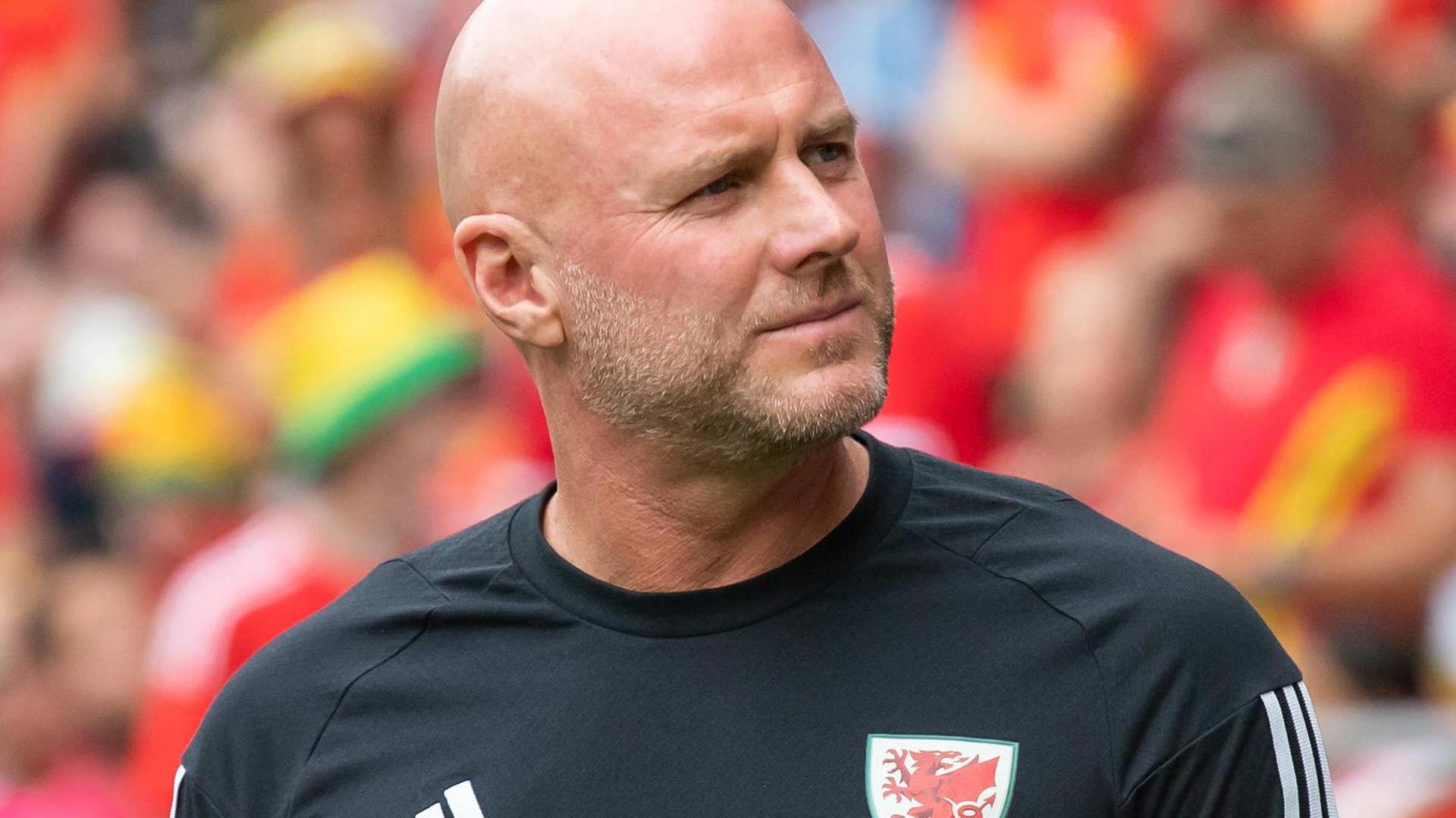Dream to nightmare - how Page's Wales reign unravelled

Former centre-back Rob Page earned 41 caps for Wales
- Published
When Wales’ journey at the 2022 World Cup was ended by defeat by England in Qatar, manager Rob Page and his players walked over to their supporters and shared a moment of mutual appreciation; disappointed their adventure was over, but proud to have been on football’s grandest stage for the first time in 64 years.
Page and his squad took the same walk to the equivalent spot of a stadium in Slovakia on Sunday night – but the contrast in reception could hardly have been starker.
Wales had just been thrashed 4-0, three days after they had been held to a humiliating draw by Gibraltar in another friendly.
The 1,000 Welsh fans in Trnava applauded their players but, when Page stepped forward to offer a raised hand of apology, he was met with boos and vitriol.
It is a long time since Wales supporters last turned on a manager, so it felt significant when they jeered Page and chanted for him to be sacked after Thursday’s dismal draw with Gibraltar.
When the same thing happened in Slovakia – in greater numbers and with more strength of feeling – Page seemed to have reached the point of no return.
These may have been friendlies, but this discontent had been brewing for some time.
Under-fire Page 'low' as fans turn on Wales boss
- Published9 June 2024
What next for Page and Wales? The pundits' views
- Published10 June 2024
World Cup highs and lows
Strange as it might sound, you could trace the start of Page’s decline to the greatest moment of his career.
By guiding Wales to their first World Cup since 1958, Page etched himself into Welsh football lore.
It was a remarkable achievement for the former Port Vale and Northampton Town boss, who had coped admirably when he was thrust into the Wales job in difficult circumstances following Ryan Giggs’ departure.
Yet even before getting to Qatar, there had been some concerning signs. Wales only won two of their 12 matches in 2022, crucially the World Cup play-off victories over Austria and Ukraine.
Given how long Wales had been made to wait to play at a World Cup, people were willing to look beyond wavering performance levels. But in Qatar, those issues caught up with Wales.
Page got his selection and tactics wrong in the opening draw with the United States and, despite saying “lessons had been learned” after snatching a fortuitous point, he repeated the same mistakes as Wales fell to a woeful 2-0 defeat against Iran which all but sealed their fate.
The damage had already been done by the time a listless 3-0 loss to England confirmed their group-stage exit.
Criticism of Page was starting to gather pace – particularly after the capitulation against Iran – but he could still cling to the pride of being the first man to lead Wales at a World Cup for 64 years.
Nightmare summers and a turbulent autumn
There was no such consolation six months later when Wales’ bid to qualify for Euro 2024 came off the rails.
They had actually started promisingly, scoring an injury-time equaliser to draw in Croatia before beating Latvia at home.
But then came the nadir of Page’s reign, a shambolic 4-2 home defeat by an Armenia side 71 places below Wales in the world rankings.
Fans and pundits reacted angrily, particularly after Page described the result as a “slap” his team might have needed.
Scrutiny intensified last October when Football Association of Wales chief executive Noel Mooney said the manager needed to keep winning games to stay in his job, comments which vice-captain Ben Davies later described as “unhelpful”.
A subsequent unbeaten run of eight games – featuring an impressive 2-1 win over Croatia – took some of the heat off Page.
But after failing to qualify for Euro 2024 after a play-off final defeat by Poland in March, doubts remained, even if FAW president Steve Williams offered immediate and public support.
Fans have tended to voice their frustrations about Page online or away from stadiums, where they have instead channelled their energies towards supporting the team.
And although they still showed their appreciation to Wales’ players in Portugal and Slovakia, supporters made their feelings known about the manager with chants of “we want Page out” and, sarcastically, “in transition” – mocking Page’s repeated appeals for patience in this post-Gareth Bale era.
It would be unusual for any association to sack a manager based on friendlies, but these matches were not isolated incidents.
With Mooney and other influential figures at both games, such pitiful results and performances – and, perhaps equally significantly, the fans’ reaction – can only have weakened Page’s position.
The FAW’s decision-makers are not giving much away for now, but Page was utterly despondent in Slovakia on Sunday, seemingly resigned to the fact that his days are numbered.
“They [fans] want me out,” he said. “I completely understand. I’ve got to stay true to myself and focused on the job in hand.
"Everything else is out of my control.”